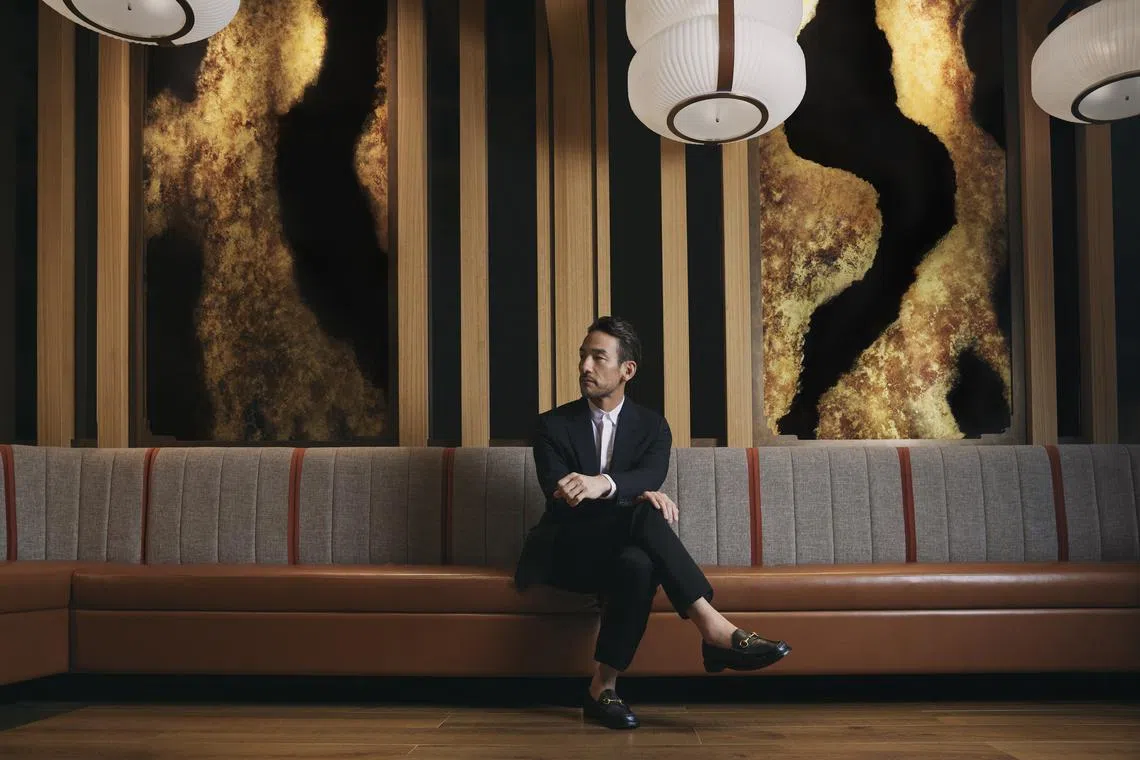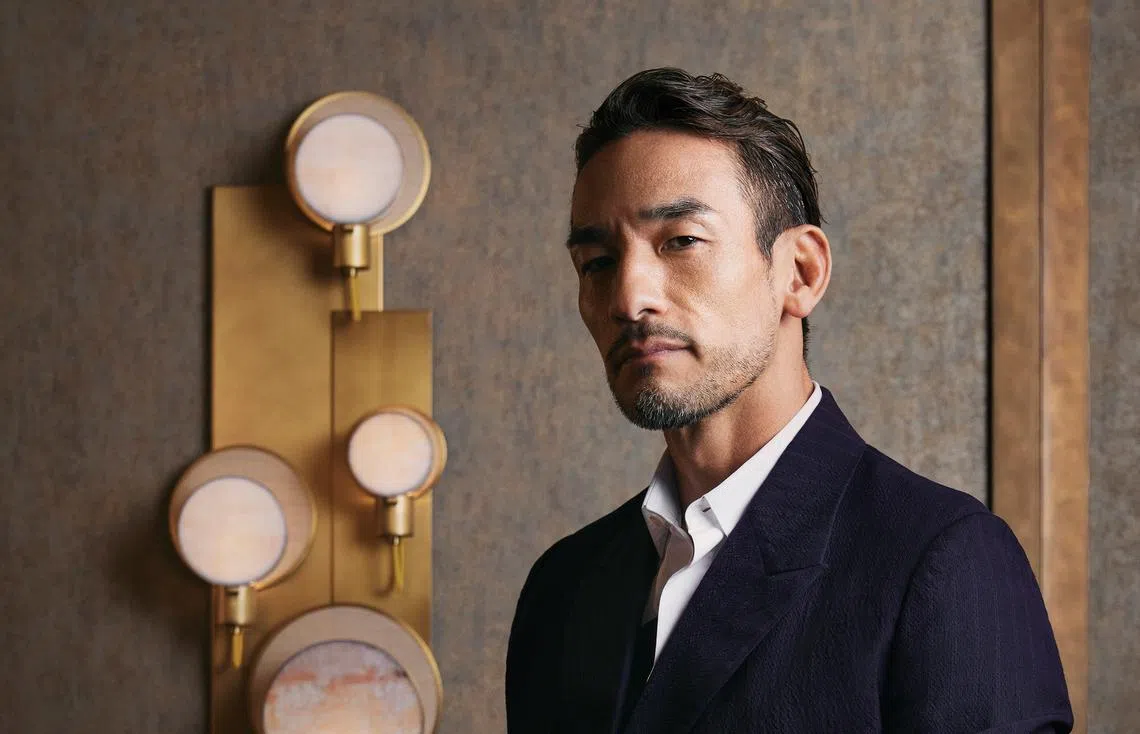Hidetoshi Nakata: making his mark from soccer to sake
The former football legend’s next goal is to bring Japanese craftsmanship to the world stage
HIDETOSHI NAKATA IS EVERYTHING EVERYWHERE all at once. He’s a busy guy, but not because of what you might think. Sure, he was a celebrity presence in Qatar last month, attending Japan’s World Cup matches and fan gatherings with fellow footballing legends, but ‘Hide’ is flying the flag on a different kind of mission these days. Simply put, he’s spreading the word about Japanese craftsmanship to a global audience, and modernising a centuries-old supply chain in the process.
Japan’s best-known export
Nakata didn’t realise it at the time but when he retired in 2006 – a superstar at 29, in his sporting prime and one of Japan’s best-known exports – he was on the cusp of something greater. It’s an ongoing journey that has taken him to some 110 countries (by his count) and every corner of Japan, including all 47 prefectures.
On the playing field, Nakata was an attacking midfielder, noted for a fine footballing brain as well as his technical ability and athletic prowess. He was able to compete with, and often outwit, more physically intimidating opponents. But after three World Cups, two Olympic Games and eight professional seasons abroad (including seven in Italy’s Serie A and a final year in the English Premier League), he fell out of love with the beautiful game and called time on a trailblazing career.
Peripatetic by nature, Nakata has spent his post-football years traversing the globe and proving to be just as classy off the field as he was on it. A nattily-dressed presence at A-list events here, articulate ambassador for global brands and charitable causes there, he is comfortable discussing any topic anywhere, whether it’s climate change with world leaders or day-to-day concerns with local farmers.

To better understand his roots, Nakata embarked on the ultimate Japan road trip: Okinawa to Hokkaido, from the bottom of the country to the top. Since 2009, he has been exploring his own backyard (he was born in Kofu, capital of Yamanashi Prefecture), learning about heritage traditions such as sake brewing and tea growing. “I felt a need to learn more about my own culture and my Japanese identity, so I decided to travel inside of Japan instead of overseas,” says Nakata, who has the ability to be both engaging and enigmatic. He is knowledgeable, articulate and dead serious in his desire to bring the best of those traditions to international markets.
Finding his true calling
According to a Japanese friend, Nakata’s eureka moment came after he finally reached Hokkaido and decided that his true calling lay in supporting crafts that were inherently Japanese. But how does a relative newcomer – albeit one who is instantly recognisable the world over – do so in a meaningful way?
Navigate Asia in
a new global order
Get the insights delivered to your inbox.
By becoming a sake entrepreneur, of course.
During a leisurely dinner at a fine-dining restaurant in SIngapore, Nakata explains how, after visits to hundreds of sake breweries, he realised he could help boost international exports by bringing modern methods to an industry that for hundreds of years had barely altered the way it conducts business.
In 2015, he founded the Japan Craft Sake Company (JCSC), which he describes as a platform to help the industry by introducing premium craft sake brands (including ‘N’, his own sake label) to a global audience. The strategy includes placements on wine lists at fine-dining restaurants in key cities.
Meanwhile, the company’s blockchain system allows interested parties to trace every bottle and track storage conditions at every stop along the distribution line (sake is light- and temperature-sensitive). The basic objective is to ensure that every bottle reaches consumers in peak condition.

“If the breweries have data, it allows them to think about their business and they can do something about making sure the sake remains in optimum condition from the moment it leaves the brewery to the time the consumer drinks it,” says Nakata. He also developed Sakenomy, a smartphone app that allows consumers to decipher sake labels and learn more about the bewildering world of sake.
His sake tip: don’t just drink it, pair it. And drink it out of a wine glass to get the most out of the aroma. Not surprisingly, he is bullish about the beverage’s export potential (the value of Japan’s sake exports is on the rise – S$397.5 million in 2021) and its ability to pair with non-Japanese cuisines.
“When I played football, I didn’t have great technique, and I knew the limits of my ability,” he says. “But football is not all about ability, it’s also about reading the game. I started thinking a lot about how to maximise my ability, controlling all 22 players including myself, so in a way, this method of analysing data to optimise workflow is why the sake blockchain concept came naturally.” He adds: “To think about this system, you have to spend time in the location, see their problems. It’s not only sake – I want to help all these industries.”
Nakata emphasises that travel is an integral part of his vision. “For me, the most important thing is to travel the world, understanding everything. For example, how is Singapore different from other places? If you Google it, you won’t get a full understanding of the country – you have to travel here and experience it first-hand.”
Supporting Japan’s producers
Nakata’s sake company and his new luxury tea brand Hanaahu, comprising cold-brew tea blends designed specifically to pair with food, are the opening initiatives in his overall plan to protect independent farmers and promote farm-based industries to a wider audience. Ultimately, he wants to change the way the world thinks and works.
“Currently, my main interest is in the farming and fishing industries,” he says. “I’m not a farmer, but I connect with chefs and I agree with the idea to make use of everything so that there’s no waste.” Sustainability in the food industry is a major concern for Nakata. “Farmers have to invest in their crops, they have to take risks and, due to inclement weather and other factors beyond their control, don’t know if they will get the returns – this is their biggest risk. This way of doing things is not enough today.”
He adds: “We need insurance for food, and to somehow share the risk with the farmers. Customers should do this, not the agricultural cooperatives we have in Japan.”
Nakata enjoys good food – he’s dined in many of the world’s best restaurants – and counts an enviable list of brand-name chefs and winemakers among his good friends. He cites a growing interest from the West in the sake industry. “Many winemakers want to check out sake places when they visit Japan.”
Nakata is not one to tread a conventional path. Instead, he’s a firm believer in stepping out of his comfort zone, as a self-test of sorts. It’s been that way since he was a schoolboy, inspired to play football by the Captain Tsubasa manga and anime series. “If you suffer you will remember it forever,” he says. “If you stay within your comfort zone, you don’t remember.” He adds: “Curiosity makes you tired, but it also makes you feel good.”
When you’re a football legend, everyone wants to know you. At dinner, Nakata was interrupted by a group of starstruck diners, and he obliged by chatting with them for several minutes. Football is far from his mind these days, however. In Qatar, he watched games at FIFA’s invitation but he also took the opportunity to visit the country’s National Museum – learning about different cultures is always a priority.
With a vast store of information at his disposal about Japanese craftsmanship gleaned from his extensive travels – ceramics and lacquer masters to gelato cafes, soba restaurants and secret hideaways – Nakata has also created Nihonmono (nihonmono.jp/en), a travel, lifestyle and crafts website that lists his personal recommendations.
Pre-pandemic, he spent a third of his time in Tokyo, a third in other parts of Japan and a third overseas. Now, he spends less time overseas, although he’s still a fixture at events like Paris Fashion Week. As the Chinese gear up for Chinese New Year, how does he celebrate the new year in Japan? “I don’t celebrate it,” says Nakata, who after years in the spotlight, maintains a healthy work-life balance. “Sometimes I go skiing in Niseko.”
Decoding Asia newsletter: your guide to navigating Asia in a new global order. Sign up here to get Decoding Asia newsletter. Delivered to your inbox. Free.
Copyright SPH Media. All rights reserved.


